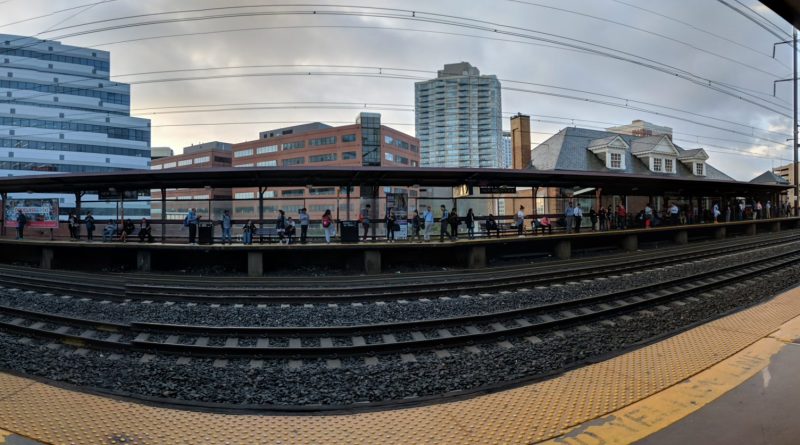The past five years have brought significant growth to New Brunswick, NJ, most notably, millions of dollars in redevelopment. Investments by several private developers, the New Brunswick Redevelopment Corporation (DEVCO), Rutgers University, and the State of New Jersey have all contributed to the city’s revitalization. This investment has helped to create a vibrant, livable downtown for residents, who have been growing in number. From 1970 to 1990, the city’s population held steady at 42,000. This figure increased to nearly 49,000 in 2000, and continued to rise to more than 55,000 in 2010 and to nearly 57,000 in 2016.
A New Jersey Transit Village since 2005, New Brunswick, aka “Hub City,” is home to Rutgers University’s main campus, as well as Johnson & Johnson’s international and US headquarters, and two university hospitals (Robert Wood Johnson and St. Peter’s), and serves as the county seat for Middlesex County. New Brunswick’s train station lies on the NJ TRANSIT Northeast Corridor line and services commuter trains to New York Penn Station at least twice an hour every day of the week. The trip to New York takes less than 60 minutes and can also be accomplished via commuter bus services on Coach/Suburban Transit. Additionally, New Brunswick hosts a number of NJ TRANSIT local bus routes, as well as regularly scheduled paratransit services via Middlesex County Area Transit.
The Yard & College Avenue Redevelopment Initiative
The centerpiece of the city’s new construction is The Yard at College Avenue on the Rutgers campus. The Yard at College Avenue is a mixed-use space in the middle of the city’s transit village. It opened in the fall of 2016 as a part of the $330 million College Avenue Redevelopment Initiative. The Yard was developed by DEVCO; it is located two blocks from the train station and right next to a major bus stop on the Rutgers campus.
The Yard is a mixed-use space comprising seven different eateries, a convenience store, plentiful outdoor seating, and a 14-story, 135-unit student apartment complex that houses almost 450 residents. The development’s centerpiece is a 25,000 square foot open green space with a Jumbotron that is used to screen sporting events, movies and daytime television. The space also hosts events like regular Sunday yoga sessions, festivals, and live music. The Yard is open to the larger New Brunswick community but, due to its proximity to Rutgers, serves mostly college students.
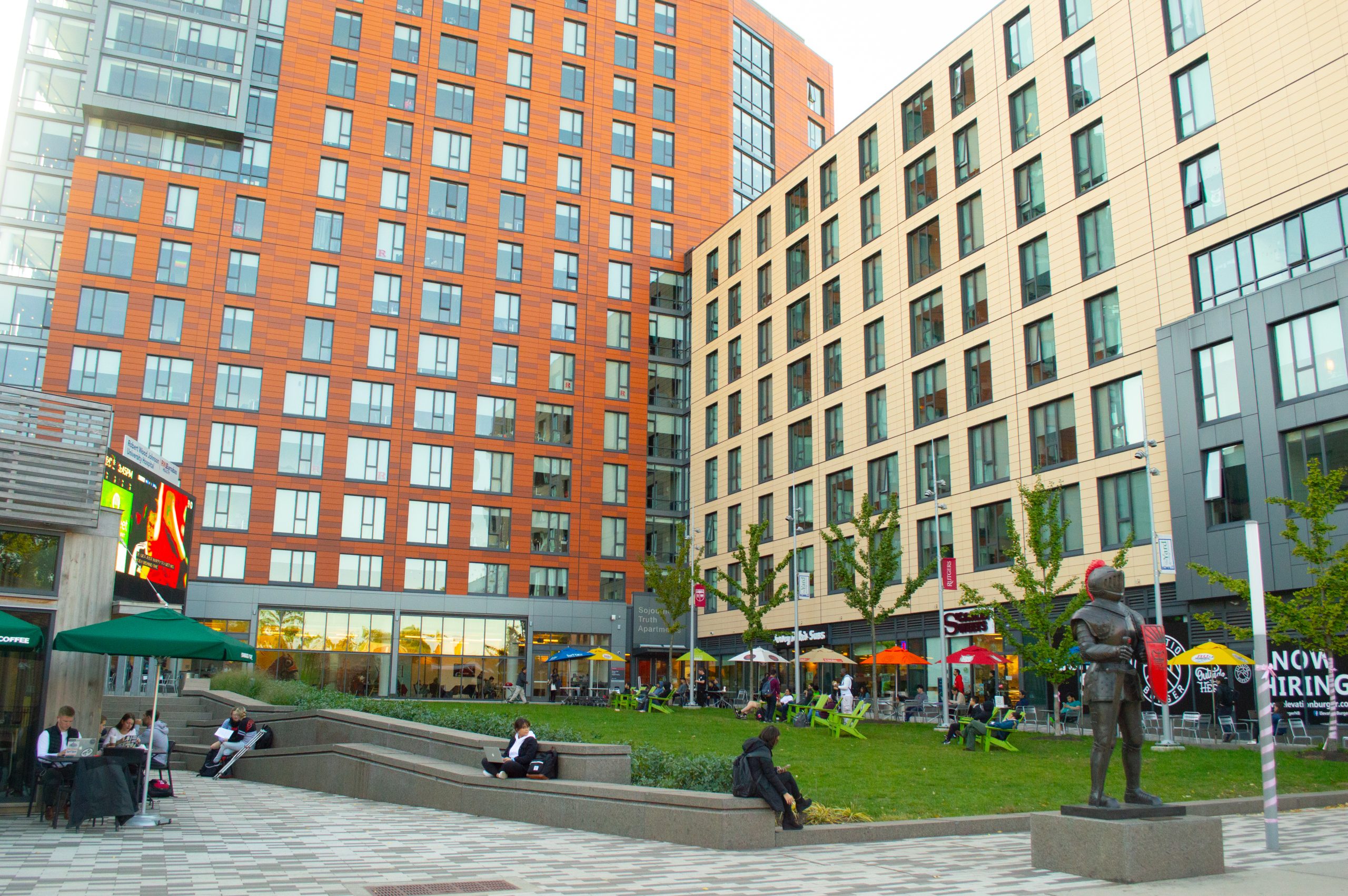
DEVCO states that “100 percent of the [approximately $91 million] cost of The Yard was funded by the proceeds of tax exempt bonds.” Tax-exempt bonds from the New Jersey Economic Development Authority provide $500,000 or more of funding to non-profit organizations who use it to construct projects owned and operated for state government bodies, such as Rutgers.
Three other buildings in the vicinity of College Avenue were completed in 2015 and 2016 under the umbrella of DEVCO’s College Avenue Redevelopment Initiative, which was partially funded by a $55 million grant from the NJ Educational Facilities Authority. At 35 Seminary Place, the New Brunswick Theological Seminary houses the 234-year-old chapter of the Reformed Church of America, a branch of the Protestant denomination, and provides continuing education to members of the ministry. Rutgers Honors College at 5 Seminary Place provides a living-learning community and an interdisciplinary education to 500 first-year students. Finally, Rutgers Academic Building at 15 Seminary Place holds an OIT computer lab, a new Learning Center for students to receive academic tutoring services, various foreign language departments, and new, technologically sophisticated lecture halls and classrooms.
Luxury Apartment Complexes
In the past five years, two luxury apartment buildings have opened in New Brunswick, catering to those who are drawn to working, playing, and living in downtown transit villages.
The Aspire, open since 2015, is located at 135 Somerset Street, one block from the train station. The developer and community manager is Boraie Development, LLC, a New Jersey-centered urban development company based in New Brunswick. The Aspire replaced eight single-family homes that were also owned by Boraie. It has 238 studio, one-bedroom, and two-bedroom units with amenities that include a green roof and 24/7 doorman. Boraie uses the development’s proximity to the New Brunswick train station, with a direct line to New York Penn Station, as a major selling point of The Aspire on social media and the Internet.
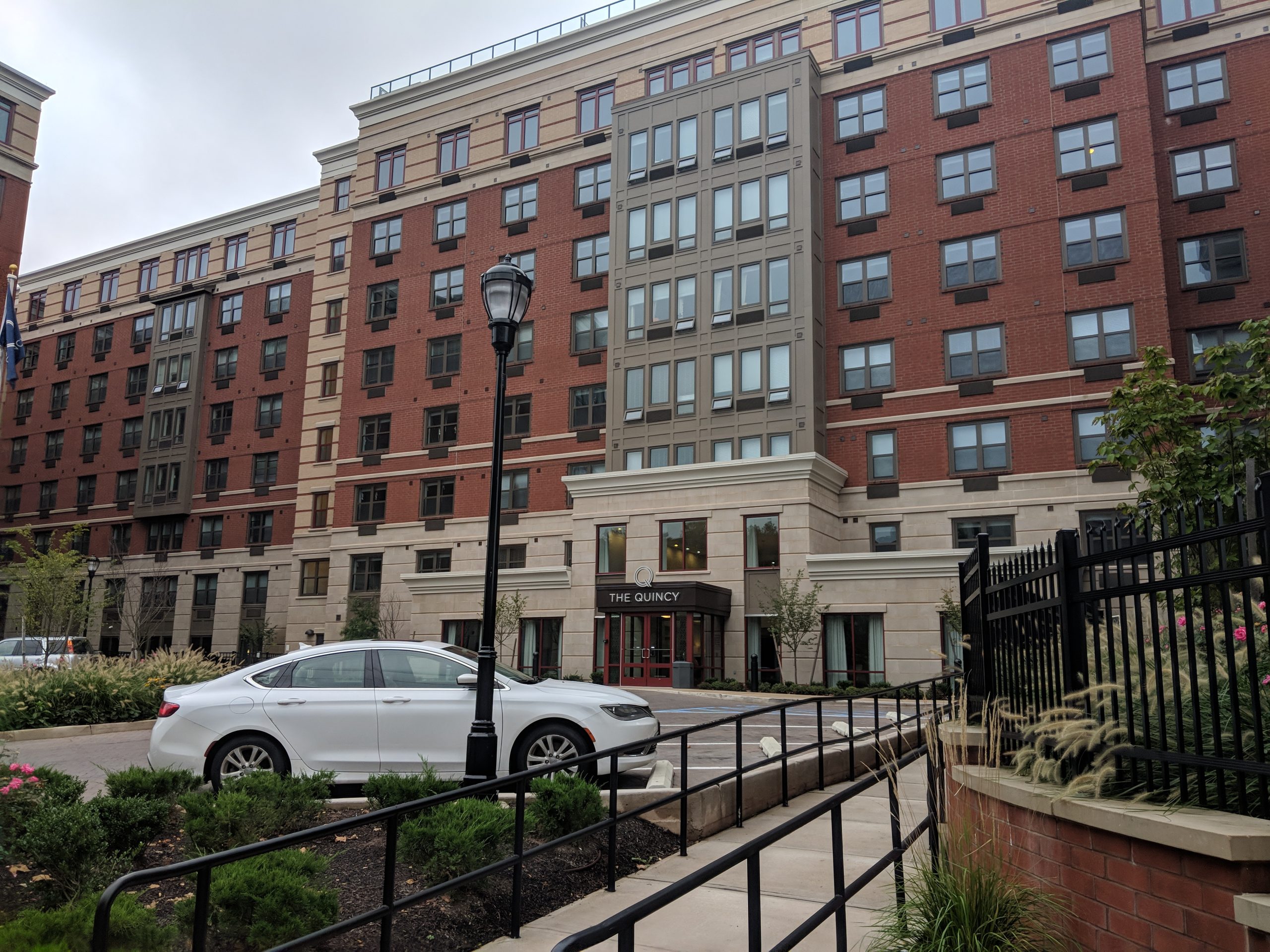
The Quincy is located at 120 Neilson Street and opened in the summer of 2018. It is a 393-unit complex with studio, one, and two-bedroom apartments and is less than a half-mile walk from the train station. The complex replaced a surface parking lot and abuts the Matrix Street Parking Deck, which provides parking for Quincy residents. The Quincy’s luxury building is situated just three blocks north of the former New Brunswick Homes public housing project that was demolished in 2000 as a part of the city’s Hope IV revitalization.
Other Developments
In the summer of 2014, the Remsen Avenue Community Center opened in a 20th-century firehouse on the corner of Remsen Avenue and Suydam Street. The center is run by the New Brunswick-based organization Unity Square, a branch of Catholic Charities. Local architect DIGroupArchitecture redesigned the building exterior and spaces within the firehouse to accommodate the community center’s needs, including a kitchen, main lobby, and office spaces.
Summer 2018 saw the ribbon-cutting of Phase 1 of the Robert Wood Johnson Emergency Department Expansion along Little Albany Street. The expansion, scheduled to be completed by 2020, will add 20,000 square feet to the emergency department, as well as new private treatment areas and three new trauma bays. This addition follows the hospital’s East Tower opening in 2015 on the parcel of land between French Street and Little Albany Street that is the former site of Doll’s Place, a long-standing New Brunswick bar. Purchased by RWJ Hospital in 2005, the site was initially intended to house a stem cell research facility, but after a funding bill failed to pass in 2007, the parcel remained a gravel parking lot until construction of the East Tower in 2014. Doll’s Place relocated across the tracks to 101 Paterson Street, and in 2013 sold the property to Destination Dogs, which remains at the site today.
37 Easton Avenue, formerly the site of New Jersey Books, was purchased by Saxum Real Estate, LLC in 2017 and is managed by JLL. Saxum has renovated the interior and exterior of the two story, 18,000 square foot building, including floor to ceiling windows on both floors. Three tenants have signed leases for the building: Burgerim Gourmet Burgers, The Halal Guys, and Frutta Bowls LLC. As of October 2018, both Burgerim and Frutta Bowls are open, holding 10- and 5-year leases, respectively, with the Halal Guys scheduled to open on a 10-year lease by the end of 2018. The second floor of the building has not yet been leased to a tenant, although reports say it is being marketed as an office space.
Transportation Updates
On Sunday, October 14, 2018, New Brunswick hosted Ciclovia for the 14th time. The event originated in October 2013 as a local offshoot of Ciclovía in Bogota, Columbia, where every Sunday and on public holidays main streets in the city are closed to vehicular traffic and opened to public activities. New Brunswick’s Ciclovia is organized by a partnership of New Brunswick Tomorrow, the City of New Brunswick, Johnson & Johnson, and Rutgers University. For five hours on selected Saturdays, main streets in the city are closed to vehicles and open to pedestrians, bicyclists, skateboarders, food stalls, sports, and other activities in the street. The numbers for the most recent Ciclovia have not been released, but the April 2018 event hosted 14,582 people.
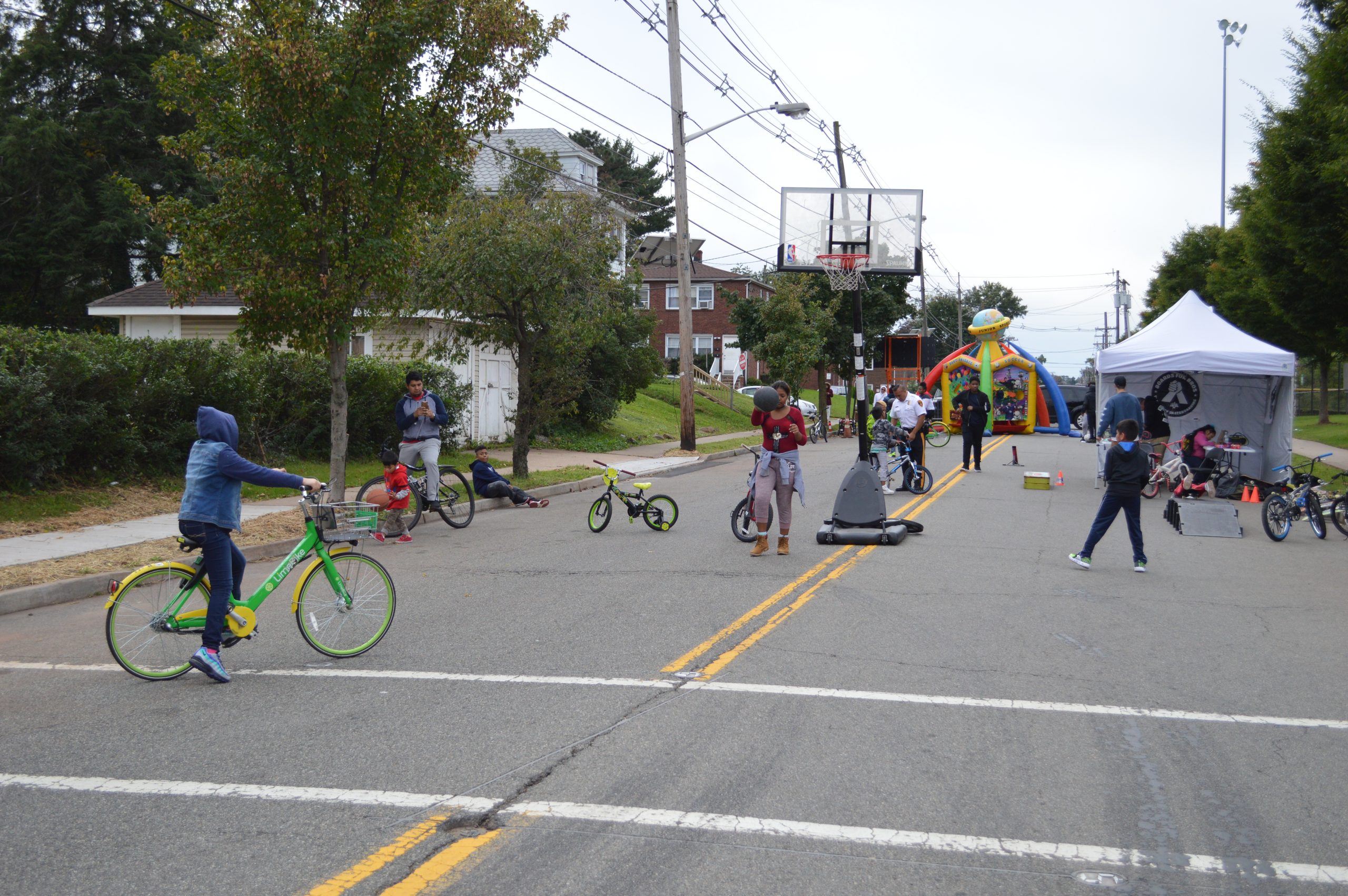
In the last five years, the City of New Brunswick has made a concerted effort to increase bike friendliness. Under its “Complete Streets” program, roads have been repaved with on-street bike lanes where the road width allows. The below map shows the extent of the city’s bike lanes as of October 5, 2016. A main goal of the program for the city was to create an on-street bike lane between Rutgers’ College Avenue and Cook/Douglass campuses. This two-mile lane, completed early 2016, runs along George Street and then switches to Neilson Street after crossing Route 27. An on-street bike lane was also installed along Remsen Avenue using Community Development Block Grant funding. Where the road width does not allow for on-street bike lanes, other streets in the city have “sharrows,” or bike lanes shared with vehicles. These sharrows are denoted by a double headed arrow above the usual “bike lane” symbol to make drivers aware of the shared space.
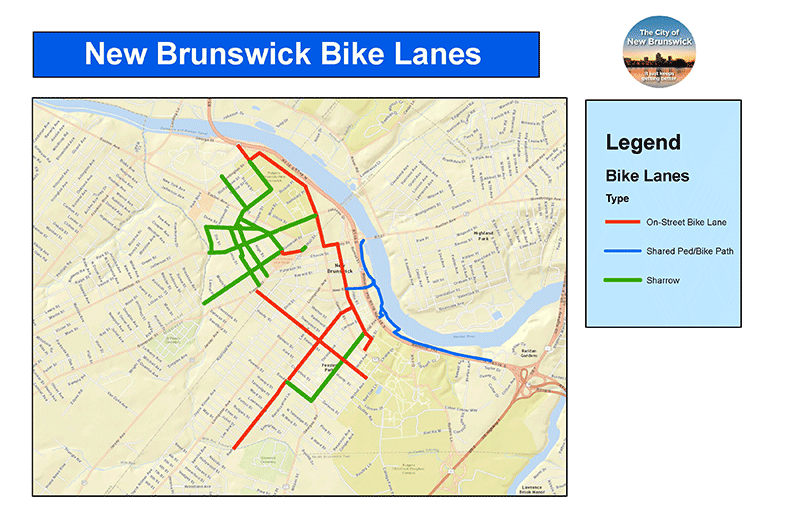
New Brunswick has also made significant pedestrian improvements in the past few years. After adopting a Complete Streets policy in 2012, the city has installed flashing crosswalks, curb extensions, intersection bump-outs, and three-foot pylons on intersection corners to prevent illegal parking and draw awareness to pedestrians and sidewalks.
Future Developments
The lot at 90 New Street, beside the Morris Street Parking deck, is being developed by Landmark Properties into a 21-story apartment and retail space. The Standard at New Brunswick will be marketed towards Rutgers students living off campus, with 186 units holding 682 beds. It will also include 2,100 square feet of retail and 10,700 square feet of amenity space.
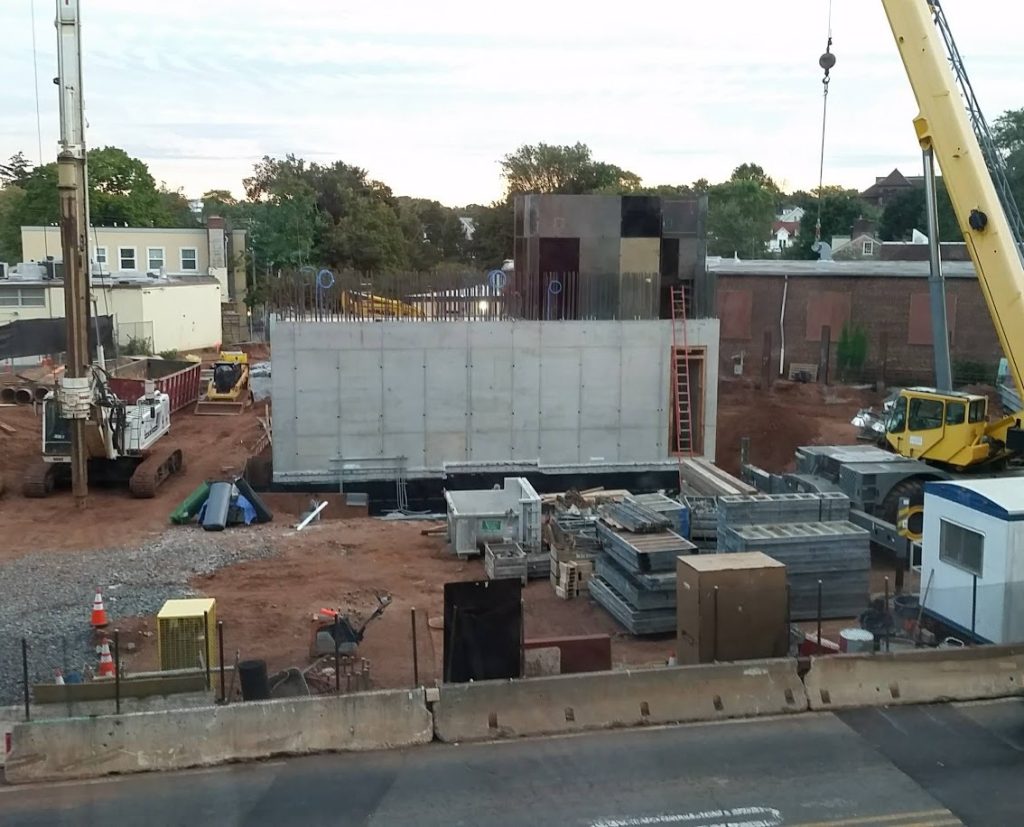
“Construction for the New Brunswick Performing Arts Center is on schedule,” notes DEVCO vice President Merissa Buczny. “The facility will be completed by the end of July 2019 and performances will begin at the end of August.” The 450,000 square foot, 25 story building will be a multi-use environment, hosting senior living apartments, a theater, playhouse, bar, lobby, and rehearsal spaces. The Center has a multitude of investors and partners in both the public and private sectors. Rutgers has invested $17 million of the $215 million total cost of the project, which will host performance spaces to be used by Mason Gross School of the Arts. A 30-year bond issued by the New Brunswick Parking Authority will fund $21.3 million of the project and will include 344 parking spaces adjacent to the main tower. The New Jersey Economic Development Authority issued a $40 million Economic Development and Regrowth tax credit, and $16.5 million in Redevelopment Area Bonds came from the City of New Brunswick. State and federal tax credits for the project will be purchased by Investors Bank, Citibank NA, AEGON, and Capital One. The theater and playhouse will be used by additional partners George Street Playhouse, American Repertory Ballet, and Crossroads Theater. DEVCO reports that leasing for the apartments has not yet begun, but the leasing office will open in spring 2019.
Construction for the New Brunswick Performing Arts Center is on schedule,” notes DEVCO vice President Merissa Buczny. “The facility will be completed by the end of July 2019 and performances will begin at the end of August.”
The northeast corner of Welton Street and Drift Street in Ward 5 is slated to receive a new neighborhood park that could open as soon as summer 2019. An 883-million-dollar bid was approved by New Brunswick’s city council to construct the park in place of three abandoned homes that have already been demolished. The plan for the park includes playground fixtures, plentiful and varied seating options, two gardens, crosswalk bump out art for the Welton/Drift intersection, and interactive music areas. Welton Street Neighborhood Park is a part of New Brunswick’s Parks Action Plan, which is a collaboration between New Brunswick, Rutgers, and the Trust for Public Land. Also included in the plan are additional improvements to New Brunswick’s 16 existing parks and construction of another park on a cleared site on Neilson Street between Bayard and Liberty Streets. The site was formerly a parking garage. The full Parks Action Plan can be found here.
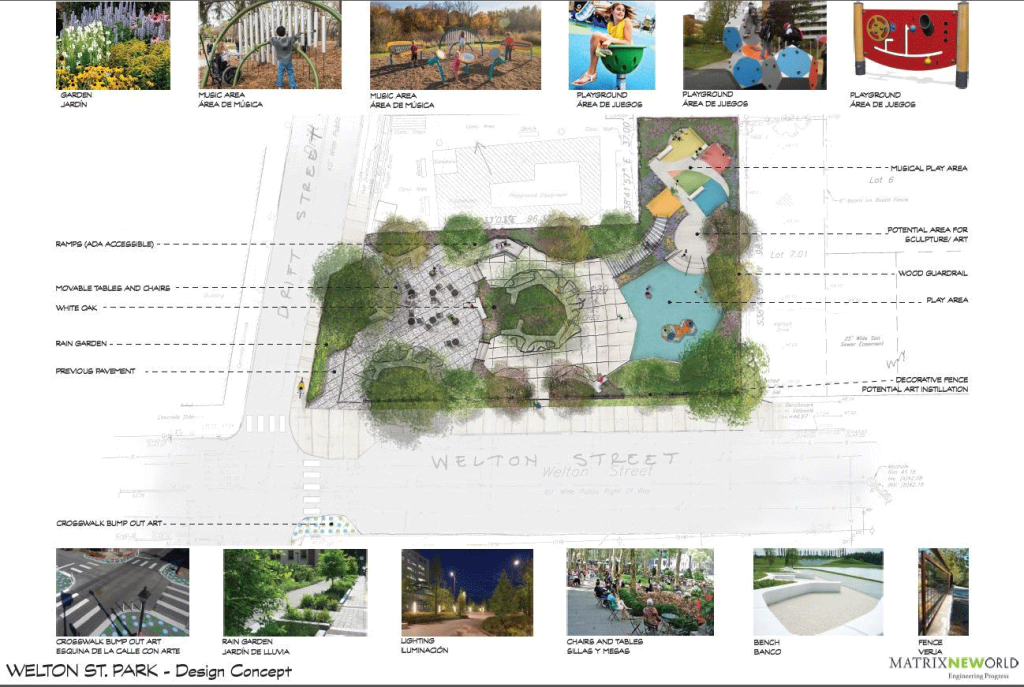
Finally, the Hub at New Brunswick Station, a DEVCO project, has finished its site preparation work and is holding on construction start until further details are finalized. The development is located on the former site of Ferren Mall, the parcel surrounded by NJ Route 27, Kirkpatrick Street, Paterson Street, and Spring Street. Plans call for a 1.7 million square foot, mixed-use facility that includes a sky bridge across Route 27 to the New Brunswick train station. DEVCO has used the site’s proximity to a direct transit line to New York City as a major marketing point to potential tenants. Current site plans call for seven distinct structures on the block, with ground floor retail, and office and apartment space on the 2nd and 3rd floors. Funding and tax incentives are anticipated from several New Jersey development programs, including Grow NJ, the Urban Enterprise Zone Program, and Choose: New Jersey.

